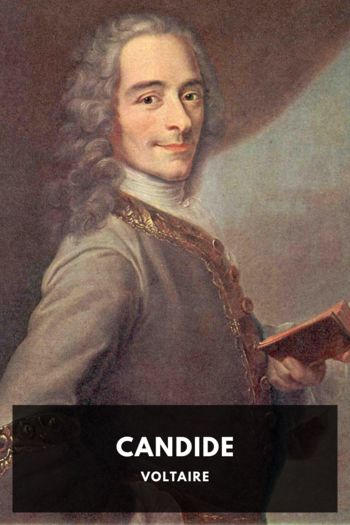Candide, Voltaire [free ebook novel TXT] 📗

- Author: Voltaire
- Performer: 0143039423
Book online «Candide, Voltaire [free ebook novel TXT] 📗». Author Voltaire
“You cannot run away,” said she to Cunegund, “but you have nothing to fear; it was not you who killed My Lord Inquisitor: besides, as the Governor is in love with you, he will not suffer you to be ill-treated; therefore stand your ground.”
Then hurrying away to Candide, she said, “Be gone hence this instant, or you will be burned alive.”
Candide found there was no time to be lost; but how could he part from Cunegund, and whither must he fly for shelter?
The Reception Candide and Cacambo Met with among the Jesuits in Paraguay
Candide had brought with him from Cadiz such a footman as one often meets with on the coasts of Spain and in the colonies. He was the fourth part of a Spaniard, of a mongrel breed, and born in Tucuman. He had successively gone through the profession of a singing boy, sexton, sailor, monk, peddler, soldier, and lackey. His name was Cacambo; he had a great affection for his master, because his master was a very good man. He immediately saddled the two Andalusian horses.
“Come, my good master, let us follow the old woman’s advice, and make all the haste we can from this place without staying to look behind us.”
Candide burst into a flood of tears, “O my dear Cunegund, must I then be compelled to quit you just as the Governor was going to honor us with his presence at our wedding! Cunegund, so long lost and found again, what will now become of you?”
“Lord!” said Cacambo, ‘she must do as well as she can; women are never at a loss. God takes care of them, and so let us make the best of our way.”
“But whither wilt thou carry me? where can we go? what can we do without Cunegund?” cried the disconsolate Candide.
“By St. James of Compostella,” said Cacambo, “you were going to fight against the Jesuits of Paraguay; now let us go and fight for them; I know the road perfectly well; I’ll conduct you to their kingdom; they will be delighted with a captain that understands the Bulgarian drill; you will certainly make a prodigious fortune. If we cannot succeed in this world we may in another. It is a great pleasure to see new objects and perform new exploits.”
“Then you have been in Paraguay?” asked Candide.
“Ay, marry, I have,” replied Cacambo. “I was a scout in the College of the Assumption, and am as well acquainted with the new government of the Los Padres as I am with the streets of Cadiz. Oh, it is an admirable government, that is most certain! The kingdom is at present upwards of three hundred leagues in diameter, and divided into thirty provinces; the fathers there are masters of everything, and the people have no money at all; this you must allow is the masterpiece of justice and reason. For my part, I see nothing so divine as the good fathers, who wage war in this part of the world against the troops of Spain and Portugal, at the same time that they hear the confessions of those very princes in Europe; who kill Spaniards in America and send them to Heaven at Madrid. This pleases me exceedingly, but let us push forward; you are going to see the happiest and most fortunate of all mortals. How charmed will those fathers be to hear that a captain who understands the Bulgarian military drill is coming to them.”
As soon as they reached the first barrier, Cacambo called to the advance guard, and told them that a captain wanted to speak to My Lord, the General. Notice was given to the main guard, and immediately a Paraguayan officer ran to throw himself at the feet of the Commandant to impart this news to him. Candide and Cacambo were immediately disarmed, and their two Andalusian horses were seized. The two strangers were conducted between two files of musketeers, the Commandant was at the further end with a three-cornered cap on his head, his gown tucked up, a sword by his side, and a half-pike in his hand; he made a sign, and instantly four and twenty soldiers drew up round the newcomers. A sergeant told them that they must wait, the Commandant could not speak to them; and that the Reverend Father Provincial did not suffer any Spaniard to open his mouth but in his presence, or to stay above three hours in the province.
“And where is the Reverend Father Provincial?” said Cacambo.
“He has just come from Mass and is at the parade,” replied the sergeant, “and in about three hours’ time you may possibly have the honor to kiss his spurs.”
“But,” said Cacambo, “the Captain, who, as well as myself, is perishing of hunger, is no Spaniard, but a German; therefore, pray, might we not be permitted to break our fast till we can be introduced to His Reverence?”
The sergeant immediately went and acquainted the Commandant with what he heard.
“God be praised,” said the Reverend Commandant, “since he is a German I will hear what he has to say; let him be brought to my arbor.”
Immediately they conducted Candide to a beautiful pavilion adomed with a colonnade of green marble, spotted with yellow, and with an intertexture of vines, which served as a kind of cage for parrots, humming birds, guinea hens, and all other curious kinds of birds. An excellent breakfast was provided in vessels of gold; and while the Paraguayans were eating coarse Indian corn out of wooden dishes in the open air, and exposed to the burning heat of the sun, the Reverend Father Commandant retired to his cool arbor.
He was a very handsome young man, round-faced, fair, and fresh-colored, his eyebrows were finely arched, he had a piercing eye, the tips of his ears were red, his lips vermilion, and he had a bold and commanding air; but such a boldness as neither resembled that of a Spaniard nor of a Jesuit. He ordered Candide and Cacambo to have their arms restored to them, together with their two Andalusian horses. Cacambo gave the poor beasts some oats to eat close by the arbor, keeping a strict eye upon them all the while for fear of surprise.
Candide having kissed the hem of the Commandant’s robe, they sat down to table.
“It seems you are a German,” said the Jesuit to him in that language.
“Yes, Reverend Father,” answered Candide.
As they pronounced these words they looked at each other with great amazement and with an emotion that neither could conceal.
“From what part of Germany do you come?” said the Jesuit.
“From the dirty province of Westphalia,” answered Candide. “I was born in the castle of Thunder-ten-tronckh.”
“Oh heavens! is it possible?” said the Commandant.
“What a miracle!” cried Candide.
“Can it be you?” said the Commandant.
On this they both drew a few steps backwards, then running into each other’s arms, embraced, and wept profusely.
“Is it you then, Reverend Father? You are the brother of the fair Miss Cunegund? You that was slain by the Bulgarians! You the Baron’s son! You a Jesuit in Paraguay! I must confess this is a strange world we live in. O Pangloss! what joy would this have given you if you had not been hanged.”
The Commandant dismissed the Negro slaves, and the Paraguayans who presented them with liquor in crystal goblets. He returned thanks to God and St. Ignatius a thousand times; he clasped Candide in his arms, and both their faces were bathed in tears.
“You will be more surprised, more affected, more transported,” said Candide, “when I tell you that Miss Cunegund, your sister, whose belly was supposed to have been ripped open, is in perfect health.”
“In your neighborhood, with the Governor of Buenos Ayres; and I myself was going to fight against you.”
Every word they uttered during this long conversation was productive of some new matter of astonishment. Their souls fluttered on their tongues, listened in their ears, and sparkled in their eyes. Like true Germans, they continued a long while at table, waiting for the Reverend Father; and the Commandant spoke to his dear Candide as follows.
How Candide Killed the Brother of His Dear Cunegund
Never while I live shall I lose the remembrance of that horrible day on which I saw my father and mother barbarously butchered before my eyes, and my sister ravished. When the Bulgarians retired we searched in vain for my dear sister. She was nowhere to be found; but the bodies of my father, mother, and myself, with two servant maids and three little boys, all of whom had been murdered by the remorseless enemy, were thrown into a cart to be buried in a chapel belonging to the Jesuits, within two leagues of our family seat. A Jesuit sprinkled us with some holy water, which was confounded salty, and a few drops of it went into my eyes; the father perceived that my eyelids stirred a little; he put his hand upon my breast and felt my heartbeat; upon which he gave me proper assistance, and at the end of three weeks I was perfectly recovered. You know, my dear Candide, I was very handsome; I became still more so, and the Reverend Father Croust, superior of that house, took a great fancy to me; he gave me the habit of the order, and some years afterwards I was sent to Rome. Our General stood in need of new recruits of young German Jesuits. The sovereigns of Paraguay admit of as few Spanish Jesuits as possible; they prefer those of other nations, as being more obedient to command. The Reverend Father General looked upon me as a proper person to work in that vineyard. I set out in company with a Polander and a Tyrolese. Upon my arrival I was honored with a subdeaconship and a lieutenancy. Now I am colonel and priest. We shall give a warm reception to the King of Spain’s troops; I can assure you they will be well excommunicated and beaten. Providence has sent you hither to assist us. But is it true that my dear sister Cunegund is in the neighborhood with the Governor of Buenos Ayres?”
Candide swore that nothing could be more true; and the tears began again to trickle down their cheeks. The Baron knew no end of embracing Candide, be called him his brother, his deliverer.
“Perhaps,” said he, “my dear Candide, we shall be fortunate enough to enter the town, sword in hand, and recover my sister Cunegund.”
“Ah! that would crown my wishes,” replied Candide; “for I intended to marry her; and I hope I shall still be able to effect it.”
“Insolent fellow!” cried the Baron. “You! you have the impudence to marry my sister, who bears seventy-two quarterings! Really, I think you have an insufferable degree of assurance to dare





Comments (0)